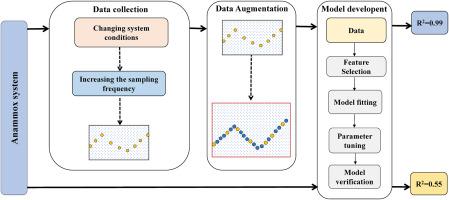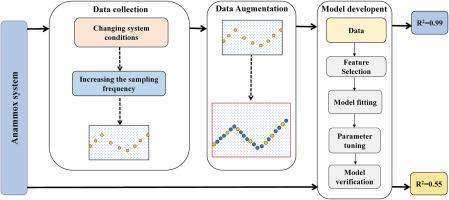提高废水处理工艺的预测精度:优化数据收集和增加运行状态多样性的方法
IF 10
1区 环境科学与生态学
Q1 ENGINEERING, ENVIRONMENTAL
引用次数: 0
摘要
废水中氮磷含量过高会引起富营养化,威胁生态和人体健康。废水处理厂(WWTPs)对于减少排放至关重要,但它们通常基于最大流入和污染物浓度来运行,以确保废水符合要求,从而导致能源浪费。机器学习模型可以预测出水质量并动态调整污水处理厂参数,以保持合规性并降低能耗。然而,污水处理厂数据往往缺乏异常状态,特别是污水质量差的情况,导致数据不平衡,建模精度低。本研究通过优化氮加载率(NLR)、水力滞留时间(HRT)和进水氨浓度等系统参数,获得了更具代表性的数据集,显著提高了模型的预测精度。优化后的数据显著提高了模型预测精度,R2值从0.55 ~ 0.63提高到0.99以上。互信息分析表明,优化后的数据集具有丰富的厌氧氨氧化系统信息。该研究为稳定、节能的废水处理提供了潜在的方法。本文章由计算机程序翻译,如有差异,请以英文原文为准。


Enhancing predictive accuracy of wastewater treatment process: An approach via optimizing data collection and increasing operating state diversity
Excessive nitrogen and phosphorus in wastewater can cause eutrophication, threatening ecology and human health. Wastewater Treatment Plants (WWTPs) are crucial for reducing emissions, but they often operate based on maximum inflow and pollutant concentrations to ensure effluent compliance, leading to energy waste. Machine learning models can predict effluent quality and dynamically adjust WWTP parameters to maintain compliance and reduce energy consumption. However, WWTP data often lacks abnormal states, particularly instances of poor effluent quality, causing data imbalance and low modeling accuracy. In this study, by optimizing system parameters such as the nitrogen loading rate (NLR), hydraulic retention time (HRT), and influent ammonia concentration, a more representative dataset was collected, which significantly improved the prediction accuracy of the models. Optimized data significantly improved model prediction accuracy, with R2 values increasing from 0.55 to 0.63 to above 0.99. Mutual information analysis shows the optimized dataset is rich in information about the Anammox system. This study offers potential methods for stable and energy-efficient wastewater treatment.
求助全文
通过发布文献求助,成功后即可免费获取论文全文。
去求助
来源期刊

Journal of Cleaner Production
环境科学-工程:环境
CiteScore
20.40
自引率
9.00%
发文量
4720
审稿时长
111 days
期刊介绍:
The Journal of Cleaner Production is an international, transdisciplinary journal that addresses and discusses theoretical and practical Cleaner Production, Environmental, and Sustainability issues. It aims to help societies become more sustainable by focusing on the concept of 'Cleaner Production', which aims at preventing waste production and increasing efficiencies in energy, water, resources, and human capital use. The journal serves as a platform for corporations, governments, education institutions, regions, and societies to engage in discussions and research related to Cleaner Production, environmental, and sustainability practices.
 求助内容:
求助内容: 应助结果提醒方式:
应助结果提醒方式:


